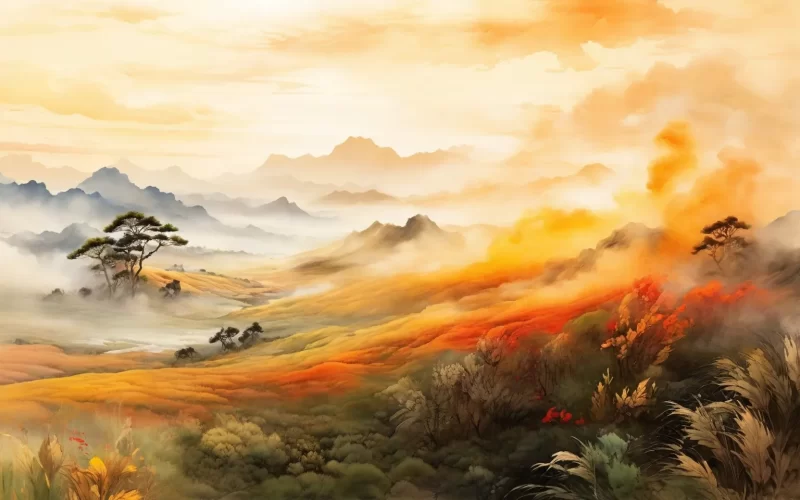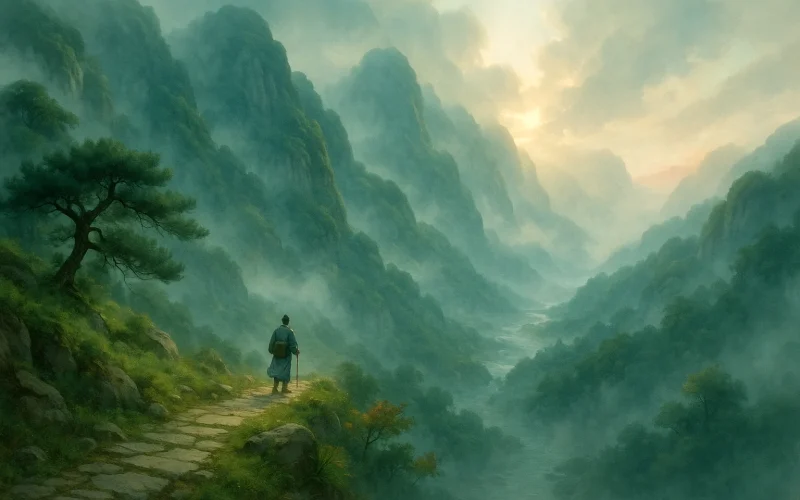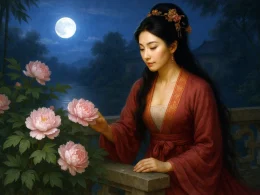Boundless grasses over the plain
Come and go with every season;
Wildfire never quite consumes them --
They are tall once more in the spring wind.
Sweet they press on the old high- road
And reach the crumbling city-gate....
O Prince of Friends, you are gone again....
I hear them sighing after you.
Original Poem:
「草」
白居易
离离原上草, 一岁一枯荣。
野火烧不尽, 春风吹又生。
远芳侵古道, 晴翠接荒城。
又送王孙去, 萋萋满别情。
Interpretation:
This poem was written by Bai Juyi in his early years. Through the depiction of the cyclical growth and withering of spring grass, the poet conveys deep friendship while also praising the resilience of life. The poem presents a broad artistic vision and profound emotions, expressing both the sorrow of parting and the encouragement of perseverance and hope, making it a timeless classic.
First Couplet:“离离原上草,一岁一枯荣。”
"Lush, lush grows the grass on the plain; it withers and flourishes year after year."
The poet begins with the imagery of grass, immediately highlighting its cyclical nature. The word "离离 (lush, lush)" vividly portrays the verdant vitality of the grass. The phrase "一岁一枯荣 (year after year)" not only describes the natural rhythm of plant life but also implies a deeper philosophy about the ups and downs of human existence, symbolizing resilience and renewal.
Second Couplet:“野火烧不尽,春风吹又生。”
"Though wildfires burn, they cannot destroy it; when the spring breeze blows, it thrives again."
This couplet is one of the most famous in Chinese poetry, illustrating the indomitable vitality of the grass. Though the flames may scorch the land, the roots remain, ready to sprout again at the first breath of spring. This symbolizes an unyielding spirit and serves as a metaphor for perseverance, encouraging one to endure hardships and look forward to renewal.
Third Couplet:“远芳侵古道,晴翠接荒城。”
"Distant fragrance spreads across the ancient path; verdant hues merge with the deserted city."
The grass not only survives but spreads rapidly, even reclaiming forgotten roads and abandoned ruins. The words “侵 (spreads)” and “接 (merges)” vividly depict its expansion, symbolizing nature’s ability to embrace the changes of time. This contrast between vibrant nature and historical decay creates a sense of harmony between past and present.
Fourth Couplet:“又送王孙去,萋萋满别情。”
"Once more, I bid farewell to my friend; the lush grass is filled with parting sorrow."
The term "王孙 (wandering noble)" refers to the departing friend. The flourishing grass, full of life, mirrors the depth of the poet’s feelings, embodying both farewell sorrow and lingering attachment. The word “萋萋 (lush)” not only describes the rich vegetation but also deepens the emotional weight of the farewell. By intertwining natural imagery with human sentiment, the poet enhances the poignancy of the departure, making it all the more touching and poetic.
Writing Features:
- Symbolic Imagery with a Clear Theme: The poem begins with the changing seasons of the grass, imbuing it with symbolic meaning, making the entire piece rich in vitality.
- Balanced Parallelism and Natural Language: The third couplet, “远芳侵古道,晴翠接荒城” (Distant fragrance spreads across the ancient path; verdant hues merge with the deserted city), features a well-structured parallelism that not only illustrates dynamic imagery but also contrasts history with the present.
- Fusion of Emotion and Scenery: By using the ever-renewing grass as a metaphor for parting sorrow, the poem blends sentiment with nature, enhancing both its poetic and philosophical depth.
- Profound Meaning with Life Philosophy: “野火烧不尽,春风吹又生” (Though wildfires burn, they cannot destroy it; when the spring breeze blows, it thrives again). This line conveys the resilience of life, hinting at the inevitable hardships of existence while reassuring that hope always remains.
Overall Appreciation:
This poem revolves around the theme of spring grass, depicting its tenacious vitality while seamlessly intertwining natural scenery with human emotions. The grass symbolizes not only the cycle of life but also an enduring hope that never fades. As the poet bids farewell to his friend, he uses the imagery of grass to reflect on resilience—both in nature and in human life. The poem combines vivid natural descriptions with philosophical musings, making it a masterpiece among farewell verses.
Insights:
Beyond being a farewell poem, this piece is a tribute to life and hope. Just as grass follows its cycle of withering and renewal, so too does human life experience trials and rejuvenation. Though challenges may arise, hope persists, much like the grass that flourishes again with the return of spring. The poem teaches us that no matter the setbacks we face, perseverance and optimism will eventually lead to new beginnings. This uplifting spirit has ensured the poem’s enduring resonance, allowing it to be cherished through generations.
Poem translator:
Kiang Kanghu
About the Poet

Bai Juyi (白居易), 772 - 846 AD, was originally from Taiyuan, then moved to Weinan in Shaanxi. Bai Juyi was the most prolific poet of the Tang Dynasty, with poems in the categories of satirical oracles, idleness, sentimentality, and miscellaneous rhythms, and the most influential poet after Li Bai Du Fu.












